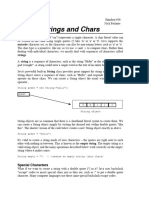0 ratings0% found this document useful (0 votes)
3 viewsJava Strings Presentation
Strings in Java are immutable objects that represent a sequence of characters and are widely used for text handling. They can be created using string literals or the 'new' keyword, and Java provides various methods for string manipulation, comparison, and concatenation. Understanding these concepts is essential for effective Java programming.
Uploaded by
saritaagrawal1092Copyright
© © All Rights Reserved
Available Formats
Download as PPTX, PDF, TXT or read online on Scribd
0 ratings0% found this document useful (0 votes)
3 viewsJava Strings Presentation
Strings in Java are immutable objects that represent a sequence of characters and are widely used for text handling. They can be created using string literals or the 'new' keyword, and Java provides various methods for string manipulation, comparison, and concatenation. Understanding these concepts is essential for effective Java programming.
Uploaded by
saritaagrawal1092Copyright
© © All Rights Reserved
Available Formats
Download as PPTX, PDF, TXT or read online on Scribd
You are on page 1/ 8
Java Strings
An Introduction to Strings in Java
What is a String?
• • A String in Java is an object that represents a
sequence of characters.
• • Strings are immutable, meaning their values
cannot be changed after creation.
• • Strings are widely used in Java programming
to handle text.
Creating Strings
• • Using String Literals:
• String str = "Hello";
• • Using the 'new' Keyword:
• String str = new String("Hello");
Common String Methods
• • length(): Returns the length of the string.
• Example: str.length();
• • charAt(index): Returns the character at the
specified index.
• Example: str.charAt(0);
• • substring(start, end): Extracts a substring.
• Example: str.substring(0, 5);
String Comparison
• • equals(): Compares the content of two
strings.
• Example: str1.equals(str2);
• • equalsIgnoreCase(): Compares strings
ignoring case.
• Example: str1.equalsIgnoreCase(str2);
• • compareTo(): Compares strings
String Concatenation
• • Using the '+' Operator:
• String result = str1 + str2;
• • Using concat() Method:
• String result = str1.concat(str2);
String Immutability
• • Strings in Java are immutable.
• • Once a string is created, it cannot be
modified.
• • Any operation on a string creates a new
string object.
Summary
• • Strings are an essential part of Java
programming.
• • Strings are immutable objects.
• • Java provides various methods to
manipulate and compare strings.
You might also like
- Java String: Java String Class Provides A Lot of Methods To Perform Operations On String Such AsNo ratings yetJava String: Java String Class Provides A Lot of Methods To Perform Operations On String Such As27 pages
- Day+4+-++Extended+-Java+Basics+-+Operators+and+StringsNo ratings yetDay+4+-++Extended+-Java+Basics+-+Operators+and+Strings17 pages
- Introduction To Java String Handling - Class - 10No ratings yetIntroduction To Java String Handling - Class - 105 pages
- Java String Interview Questions and Answers - Extracted From JournalDevNo ratings yetJava String Interview Questions and Answers - Extracted From JournalDev7 pages
- Java String: Java String Class Provides A Lot of Methods To Perform Operations On String Such AsJava String: Java String Class Provides A Lot of Methods To Perform Operations On String Such As
- Day+4+-++Extended+-Java+Basics+-+Operators+and+StringsDay+4+-++Extended+-Java+Basics+-+Operators+and+Strings
- Java String Interview Questions and Answers - Extracted From JournalDevJava String Interview Questions and Answers - Extracted From JournalDev



























































